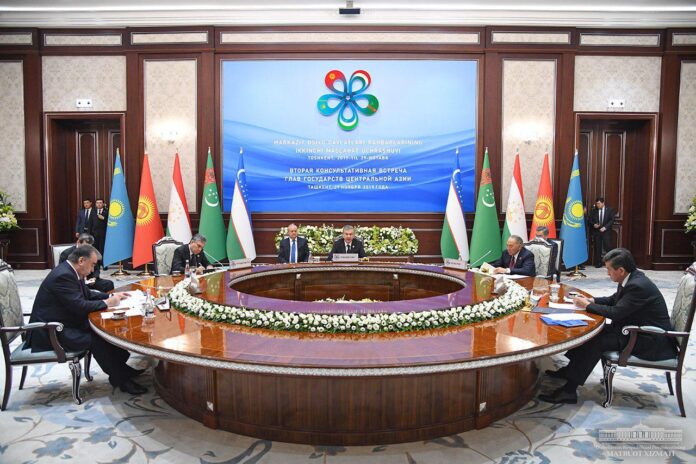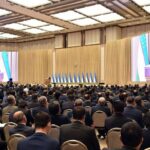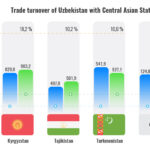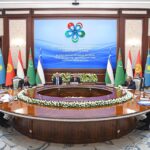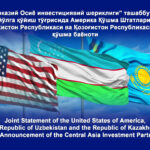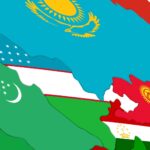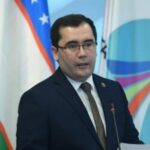a cura dell’Ambasciata dell’Uzbekistan in Italia
BY ELDOR TULYAKOV[1] AND FARRUKH KHAKIMOV[2]
[1] Eldor Tulyakov is the Executive Director of the Development Strategy Center (Tashkent, Uzbekistan)
[2] Farrukh Khakimov is the Head of Department of the Development Strategy Center (Tashkent, Uzbekistan)
The reforms, openness, transparency, renewal, and changes observed in the domestic policy of Uzbekistan in recent years are also evident in the country’s foreign policy. Uzbekistan, as an equal actor in international relations, pursues an active foreign policy at the regional and global levels by developing mutually beneficial relations with foreign partners. This consistent and constructive foreign policy is also recognized by international experts and observers. Even in these times of global pandemic, Uzbekistan has paid special attention to ensuring socio-economic stability and maintaining cooperation with the countries of the region and the international community.
One of Uzbekistan’s main foreign policy objectives is to create an atmosphere of peace, stability, and security around its territory [1]. In this regard, President Shavkat Mirziyoyev has identified the development and strengthening of friendly, good-neighborly, and mutually beneficial relations with Central Asian states as a key foreign policy priority [2]. Within the framework of the 2020 State Program, Uzbekistan continued its consistent, open, and pragmatic foreign policy activities, including with its neighbors in Central Asia.
In particular, to bring relations between Uzbekistan and the countries of the Central Asian region to a qualitatively new level, throughout 2020, state bodies for foreign policy and economic activities carried out 35 high-level visits and held various events at multiple levels. Moreover, Tashkent effectively implemented public diplomacy by conducting more than 90 different meetings, video conferences, roundtables, and other events with the participation of scientists and artists, cultural and religious figures, businesspeople and youth, tourism and sports organizations, public associations, and NGOs [3].
It should be noted that in recent years, as a result of the initiatives of President Mirziyoyev that the leaders of neighboring countries fully supported, political dialogue and personal trust among the Presidents have been strengthened. Regular consultative meetings of Central Asian leaders have been established [4].
As a result, the level of bilateral and multilateral cooperation in the region has notably improved. In particular, in 2017-2019, trade turnover with Central Asian countries increased by an average of more than 50 percent annually and amounted to $5.2 billion. According to the statistics for 2020, despite the global pandemic, the total trade turnover of Uzbekistan with Central Asian states reached $5 billion [5]. Especially, the share of Central Asian states in the total foreign trade turnover of Uzbekistan increased from 12.4 percent in 2019 to 13.6 percent in 2020, in which the share of Kazakhstan accounts for 61 percent, Kyrgyzstan – 18.2 percent, Turkmenistan – 10.6 percent, and Tajikistan – 10.2 percent [6].
Such improvement in trade and economic relations among the Central Asia states has helped to increase the investment attractiveness of the entire region. In particular, during 2017-2020, more than 300 agreements and about $75 billion worth of contracts were signed between Uzbekistan and the countries of the region [7].
As a result of Uzbekistan’s open, constructive, and pragmatic policy towards Central Asia, complex and confusing problems such as water use, delimitation and demarcation of state borders between Uzbekistan and neighboring countries, use of transport communications, and state borders crossings have increasingly been addressed and resolved throughout 2017-2020. If five years ago, the Uzbek-Kyrgyz border was crossed by 200-300 people a day, on the eve of the global pandemic this figure reached 30,000 a day, and 20,000 citizens a day crossed the Uzbek-Tajik border [8].
The openness and constructive policy of Uzbekistan towards the Central Asian states is further illustrated by the joint measures taken by the leaders of the region during the global pandemic to help each other and to mitigate the impact of the spread of the coronavirus. Despite the global pandemic, today there is an active partnership among the Central Asian states and a constant dialogue among the heads of state. Countries in the region have been providing humanitarian assistance to each other since the early days of the spread of coronavirus infection. Uzbekistan has repeatedly sent humanitarian aid to Kazakhstan, Kyrgyzstan, and Tajikistan. In response, our neighbors, such as Kyrgyzstan and Tajikistan, have provided humanitarian assistance to restore the Sardoba Reservoir. In December 2020, with the support of Uzbekistan, an infectious diseases hospital with 200 beds and fully equipped with the necessary medical equipment was commissioned in Kyrgyzstan [9]. Moreover, during the pandemic, the exchange of information and experience in the field of medicine to fight against coronavirus and the uninterrupted movement of goods across state borders of the Central Asian states was maintained.
In January 2021, the governments of Uzbekistan and Kazakhstan, together with the United States, launched the Central Asia Investment Partnership to attract at least $1 billion over five years to support projects that advance private-sector-led growth and increase economic connectivity within Central Asia and the broader region. Working through the C5+1 platform, the initiative will seek to take advantage of opportunities for increasing trade, development, and connectivity to make each country in Central Asia stronger and more prosperous [10].
The growing importance and role of Central Asia in the world community can be seen in the organization of various formats of multilateral cooperation between the region and external actors. Existing multilateral cooperation formats such as “Central Asia – United States”, “Central Asia – European Union”, “Central Asia – Republic of Korea”, “Central Asia – Japan” were enriched with the new ones such as “Central Asia – India”, “Central Asia – China” and “Central Asia – Russia”. Significantly, this indicates that the new environment created by the positive changes in the region has increased the attention of the world’s leading countries to Central Asia. It also indicates that foreign countries are focusing on developing not only bilateral cooperation but also a single regional, multilateral relationship.
The role of Central Asian states as a single political and diplomatic entity, as well as the increasing mutual understanding and solidarity of the countries of the region, was reflected in the Joint Statement of the Presidents of Uzbekistan, Kazakhstan, Turkmenistan, and Tajikistan about the protests and riots in Kyrgyzstan in October 2020. In that joint statement, the heads of other the four Central Asian states expressed the hope that all political parties and public circles in Kyrgyzstan would make the necessary efforts to ensure peace and tranquility and to resolve the problems that had arisen, by adhering to Kyrgyzstan’s constitution and national legislation [11].
It should be noted that the stability and solidarity of the Central Asian states, firstly, contributes to the well-being of the people, and secondly, increases the investment attractiveness of the region and creates opportunities for cooperation with foreign partners and investors. The new environment formed and further strengthened between Uzbekistan and the countries of the region will serve to achieve these goals and strengthen mutual political, trade, economic, cultural, and humanitarian cooperation.
President Mirziyoyev’s address to Parliament and the State Program for 2021 pays special attention to strengthening good neighborly relations with the Central Asia countries. Specifically, the State Program for 2021 – “The Year of Support for Youth and Public Health Promotion” [12] — includes an action plan for the consistent continuation of relations among Central Asian states:
- the development of a comprehensive program of measures to bring Uzbekistan’s bilateral and regional relations with Central Asian states to a qualitatively new level;
- the effective use of Public Diplomacy;
- the joint solution of existing barriers to strengthening good neighborly relations;
- the creation of favorable conditions for the development of trade and economic relations and the growth of trade turnover, strengthening cooperation;
- ensuring the effective use of transit and logistics potential of the region and the development of transport infrastructure;
- intensification of cooperation between the regions (including border areas) of Central Asia.
Uzbekistan will also work to further strengthen its relations with Central Asian states through multilateral organizations, including the United Nations (UN), the Commonwealth of Independent States (CIS), the Shanghai Cooperation Organization (SCO), the Turkic Council, the Organization for Security and Cooperation in Europe (OSCE), and other structures by improving not only political and diplomatic relations but also economic, inter-parliamentary, and public diplomacy connections. Besides, taking into account the presidency of Uzbekistan of the SCO in 2021-2022, the development of priorities and key measures is also planned in the State Program for 2021.
Uzbekistan is the only country in the region that borders all Central Asian states; any changes in the political, economic, and cultural spheres of the country directly affect other neighboring states. Uzbekistan’s current foreign policy not only enhances its international position but also contributes to the sustainable and consistent development of Central Asia as a whole, turning the region into a space of cooperation with enormous opportunity.
References:
- (2020, August 27). Zamonaviy dunyoda O’zbekiston tashqi siyosatining kun tartibi. (Uzbekistan’s current foreign policy agenda). https://uza.uz/uz/posts/zamonaviy-dunyeda-zbekiston-tash-i-siyesatining-kun-tartibi-27-08-2020
- Ministry of Foreign Affairs of the Republic of Uzbekistan. Foreign policy of the Republic of Uzbekistan. https://mfa.uz/en/pages/vneshnaya-politika
- Ministry of Foreign Affairs of the Republic of Uzbekistan. (2020, January 9). Report on the activities of the Ministry of Foreign Affairs of the Republic of Uzbekistan in 2020. https://mfa.uz/uz/press/news/2021/ozbekiston-respublikasi-tashqi-ishlar-vazirligining-2020-yildagi-faoliyati-haqida-hisobot—29088
- (2020, July 15). Central Asia – priority of foreign policy of Uzbekistan. https://www.uzdaily.uz/en/post/58469
- State Committee of the Republic of Uzbekistan on statistics. (2020, January 22). Foreign trade turnover of the Republic of Uzbekistan. https://stat.uz/images/uploads/docs/tashqi_savdo_uz_22012021.pdf
- Kutbitdinov, Yu. (2021, January 26). Central Asia in the priority of foreign policy of Uzbekistan. Review.uz. https://review.uz/post/centralnaya-aziya-v-prioritete-vneshney-politiki-uzbekistana
- Qodirov, A. (2020, July 29). Key foreign policy priorities of a renewed Uzbekistan. Institute of strategic and regional studies under the President of the Republic of Uzbekistan. http://www.isrs.uz/en/maqolalar/klucevye-prioritety-vnesnej-politiki-obnovlennogo-uzbekistana
- (2020, July 15). Central Asia – priority of foreign policy of Uzbekistan. https://www.uzdaily.uz/en/post/58469
- Ministry of health of the Republic of Uzbekistan. “With the support of Uzbekistan, a 200-bed infectious diseases hospital was built in Kyrgyzstan”, December 23, 2020, http://ssv.uz/uz/news/zbekistonning-kmagi-bilan-irizistonda-200-rinli-juumli-kasalliklar-shifohonasi-urib-bitkazildi
- Ministry of Investments and Foreign Trade of the Republic of Uzbekistan. (2021, January 7). Joint Statement of the United States of America, the Republic of Uzbekistan and the Republic of Kazakhstan on the Announcement of the Central Asia Investment Partnership. https://mift.uz/en/news/joint-statement-of-the-united-states-of-america-the-republic-of-uzbekistan-and-the-republic-of-kazakhstan-on-the-announcement-of-the-central-asia-investment-partnership
- uz. (2020, October 9). Leaders of four CA countries issue a joint statement on the situation in Kyrgyzstan. https://kun.uz/en/03652044
- Development Strategy Center. 2021 – “The Year of Support for Youth and Public Health Promotion”. https://strategy.uz/index.php?static=programma



























